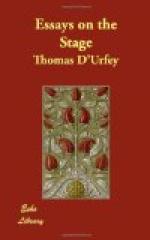I am heartily glad, if the Plays written by that ingenious Gentleman are so chast and inoffensive, as he declares them to be. The rather, because the Success he mentions overthrows that frivolous Pretence, of the Poets lying under a Necessity of writing lewdly in order to please the Town. And if this Gentleman do yet retain the same tenderness of doing nothing for Gain or Glory, which does not strictly become him: If he be still as desirous to be satisfied what does, or does not, become him to do, with regard to the matter in hand, as I ought to presume he was, when he consulted his Friend, I would make it my request, that this Reply may be Seriously and impartially considered. And I cannot but hope, that it may disabuse him of the Errours the Discourse might lead him into, and I am much mistaken, if, upon these Terms, he ever writes for the Stage any more. Prejudice and Passion, Vainglory and Profit, not Reason, and Virtue, and the Common Good, seem but too plainly, to support this Practice, and the Defence of it, as the matter is at present managed among us. And a Person of Mr. M’s Parts and Attainments cannot be at a loss, for much nobler subjects to employ them upon.
A Popular one perhaps it may be, but sure a wilder Suggestion, never was offered to men of Common sense, than, that if the Stage be damned, the Art used by Moses, and David, and Solomon, must be no more. [Footnote: See Mr. D’s. verses before Beauty, in Distress.] Are we fallen into an Age so incapable of of distinguishing, that there should be no visible difference left between, the Excellencies and the Abuse of any Art? No. Mr: Dryden himself hath taught us better. We will have all due regard for the Author of Absalom and Achitophel, and several other pieces of just renown, and should admire him for a rich Vein of Poetry, though he had never written a Play in his whole Life. Nor shall we think our selves obliged to burn the Translation of Virgil by vertue of that sentence, which seems here to be pronounced upon that of the Fourth Book of Lucretius. The World, I Suppose, are not all agreed, that then is but One Sort of Poetry, and as far from allowing, that the Dramatick, is that One. They who write after those_ Divine, Patterns of Moses &c_: will be no whit the less Poets, though there were not a Theatre left upon the Face of the Earth; Their Honours will be more deserved, Their Laurells more verdant and lasting, when blemished with none of those Reproaches from Others, or their own breasts, which are due to the Corrupters of Mankind, And such are all They, who soften men’s abhorrence of Vice, and cherish their dangerous Passions. To tell us then, that All, even Divine, Poetry must be silenced and for ever lost, when the Play-houses are once shut up, is to impose too grossely upon our Understandings. And their Sophistry bears hard, methinks, upon Profaneness, which insinuates the Hymns dictated by the Holy Spirit, of God, to be so nearly related to the Modern Compositions for the Stage, that both must of necessity stand and fall together.




